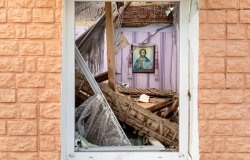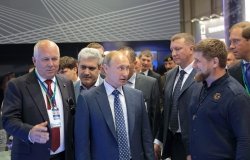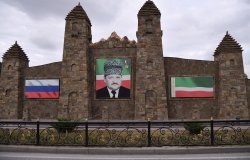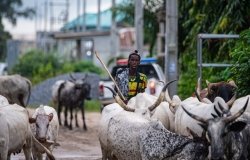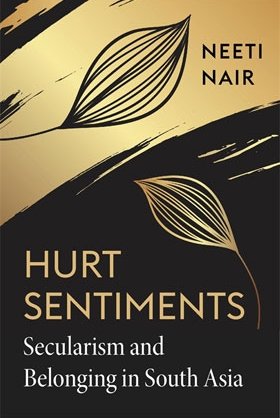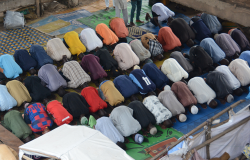Religion and Politics in Turkey: A Survey of Turkish Attitudes
Speakers: - Dr. Can Paker, Chairman, Turkish Economic and Social Studies Foundation (TESEV) - Etyen Mahcupyan, Director for the Democratization Program of the Turkish Economic and Social Studies Foundation (TESEV)
Overview
Religion and Politics in Turkey: A Survey of Turkish Attitudes
The Southeast Europe Project in conjunction with the US Commission on International Religious Freedom.
Participants: Dr. Henri Barkey, moderator; Felice D. Gaer, Chair of the U.S. Commission on International Religious Freedom; Dr. Elizabeth H. Prodromou, Vice Chair of the U.S. Commission on International Religious Freedom; Etyen Mahçupyan, director of TESEV's Democratization Program; Dr. Can Paker, chairman of TESEV.
The U.S. Commission on International Religious Freedom (USCIRF) was created by the International Religious Freedom Act of 1998 as a means of monitoring the status of freedom of thought, conscience and religion abroad. The organization is accountable to the President, Congress and the Secretary of State to provide independent policy recommendations based on their assessment of various nations' respective rights of religious freedom. Felice Gaer, chair of the USCIRF, joined with Dr. Elizabeth Prodromou, vice chair of USCIRF, at the Wilson Center on February 26, 2007 to discuss the Commission's visit to Turkey and the recent findings from TESEV's poll on Turkish attitudes towards religion and politics.
Dr. Prodromou explained that the Commission conducted a fact finding mission to Turkey, visiting Ankara and Istanbul for the first time in November 2006. They met with members of the Foreign Ministry, Ministry of Education, as well as the director general for religious affairs and members of the Turkish Parliament, cutting across all parties of the political spectrum. In addition, they also met with representatives from a wide range of the country's religious communities including academics, journalists, legal activists, members of the private sector and human rights activists to learn about conditions of religious freedom and related human rights issues. The Commission focused on the relationship between religion and the state and the impact that wider issues of secularism, political party systems, civil military relations, the judiciary and the EU accession process have. The Commission also followed up on reports of a number of religious freedom problems in the country, both for the Muslim majority and the religious minority groups that include various Christian, Jewish, and Orthodox faiths. Some issues within the Muslim community dealt with the restraints on the ability to convey their beliefs in public spaces, whereas minority groups expressed their concern for state actions against their property rights and the ability to train their clergy.
The Commission was informed of the lively debates regarding legal and educational reform measures necessary to address the remaining EU-mandated reforms. They were very much struck by the degree to which these issues are a part of public discourse and public debate.
At that time, USCIRF met with the Turkish Economic and Social Studies Foundation (TESEV), a leading think tank that had taken polls in 1999 and were in the process of completing the findings of their 2006 poll, which would provide a statistical basis for the opinions of the Turkish population on their perceptions of freedom to practice their faith. The Commission expressed interest in co-sponsoring an event in the US with the Wilson Center for TESEV members, Etyen Mahçupyan and Dr. Can Paker, to discuss their findings. Dr. Prodromou noted that the Commission in no way endorses the findings and opinions, but respects the input as a useful tool to providing a broader context for the Commission to base its conclusions and findings from the trip.
Etyen Mahçupyan, director of TESEV's Democratization Program, provided the historical context for the views of Turkey's Muslim majority, noting that there are two mistakes which the secular community makes when approaching the Muslim Community: 1) the assumption that the political parties represent the demands of that community and 2) that an intra-secularist debate addresses the understanding of the Muslim Community. These two assumptions are difficult to dismiss lightly. One must recall, Mahçupyan noted, that every change within the Islamic community is a direct reaction to the external political and social environment. To understand this, Mahçupyan noted, three distinct periods where major changes were evident; the 1980s, 90s through 97, and 97 to present day.
The 80s saw the Islamic Revolution in Iran, which brought about the idea of the global Ummah, or universal community of believers in Islam. The revolution posed two questions for followers: how to be Muslim in an environment made hostile by the forces of modernity and how those same Muslims should live out their faith on a day to day basis. Towards the late 1980s there appeared to be a soft culture surrounding Islamism, one in which those of the faith sought a Muslim identity that suited them and fit the global world.
The 1990s with the collapse of the Soviet system and a critique within the west of modernity helped demonstrate to Muslims that perhaps the western world and its culture were not as successful as first thought, creating a new self confidence. This altered the public discourse to how Islamic and non-Islamic lives coexist with each other.
The mid 90s brought a wave of cultural change in Muslim communities. Islamic banking, started in the 80s, had collapsed and new multi-partnered Islamic firms where sprouting. New business opportunities for Muslims emerged, for the first time Muslim film directors, film critics, writers, as well as, Islamic rock groups came forward. The Muslim community had started to adapt itself to the globalized world, but demonstrated that it could be done without forgetting one's heritage.
One important aspect for change was the implication of the head scarf. In the 1980s, women with headscarves in the public sphere were not perceived as being independent, for the scarf was still recognized as a symbol of subservience to the man. By the 1990s societal perceptions of the scarf had changed; women who wore a head covering liberated themselves by convening, through informal networks, and educating themselves. The head scarf started to symbolize more of a social rather than political symbol.
In 1997 Turkey experienced a post-modern coup which hastened the separation of new Muslims from paternalistic political parties. Mahçupyan, conjectured, that the liberation of the woman and the scarf led to the liberation of the Muslim man from political constraints and a multi-actor political system emerged in Muslim communities. For the first time political dialogue occurred centered within the Muslim community, rather than about the Muslim community. Mahçupyan posits that this change, or liberation, in society is what helped crate the Justice and Development Party (AKP). At this point Turkey was initiating its European Union (EU) process, which brought with it the notion of EU, or universal, values that were to be implemented. This notion of universal values made it adaptable to Muslim values as well. One could liberate themselves, not only politically but ideologically from the, perceived, over Secularized state.
Around the turn of the century there were questions both outside and within the Muslim Community as to what role they should play in the global social order. The whole process brought about a catharsis based on four pillars: 1. Diversification of the Islamic sphere, where the economic and political spheres are not based on religion; 2. Diversification in defining Islam, where every individual has a right to their perception of Islam; 3. Plurality, created by contradictions within peoples minds of what it means to be Muslim; and 4) Perceptions of proper Muslim guides where the future of Muslims is synthesized with the western world. This can be termed, according to Mahçupyan, as a Post-modern Secularization from within. He sees Turkey as not turning away from religion, but rather diversifying the idea of being Muslim, thus enlarging the public sphere where Muslims can co-exist within non-Muslim principles.
From this, three "emancipations" result: 1) The "emancipation" of politics from the hands of political actors, enabling the youth to be more involved, 2) The "emancipation" of morality from religion, for example the scarf has nothing to do with morality, and 3) The "emancipation" of the Muslim identity from the Turkish identity.
Dr. Can Parker presented the statistical findings of the data, which illustrated the opinions expressed in Mahçupyan's presentation, as well as more specific sectors of religiosity versus secularism. The survey was conducted in May 2006, as a follow-up to the 1999 survey to demonstrate the changes which had taken place in the nearly seven year gap – one filled with political, economic and social change. Paker noted there were already increasing signs of polarization between Secularists and Islamists, raising suspicion from military and secularist establishments.
Changes affecting the 1999 poll included the impact of high unemployment rates, an end to the unstable coalition government, and reform packages to move Turkish democracy towards greater consolidation. The study sought to quantify the change in the society concerning secularism, Islam and politics, noticeable in: 1) Interdependence of Individual's religious sensitiveness and political choices made, 2) Individual's perceptions of other fundamental social problems in Turkey, 3) The individual's views and daily practices regarding social economic values, and 4) The individual's views of the notion of religion in the public sphere.
The data demonstrated that the population feels the freedom and ability to think religiously has increased the past near decade. The percentages of those in favor of an Islamic, or Shariah, state, however, are noticeably decreased – from 21% to 9% - very basically stating that religiosity has a high position of value in public opinion and extremism is unquestionably down. Paker also expressed that it was important to note that although citizens interest in the Islamic state was 21% in '99, when conditions detailing the Shariah type state were presented percentages in those answers went down. For example, in specific questions regarding inheritance for girls, where girls would receive equal shares, and punishment of adultery, typically done by stoning, percentages shot down to 5% and .1% respectively.
The conceptualization of democracy also produced an interesting percentage: 77% of the surveyed Turkish population believes that democracy is the best form of government, with 54% believing that secularism can be better protected through democratic means than with an army. The study also showed very little support for terrorist activities, even when presented with scenarios where the country would be under attack by invasion forces, respondents believed that it was inappropriate to use suicide bombers against invasion forces.
Paker believes that a multicultural and pluralistic understanding is not well rooted in Turkey, instead a us vs. the other distinction is made between citizens of different religious beliefs, or cultural and ethnic backgrounds. He believes that Turkey is in between moving from, what he calls a peasant society, where there are centralized authoritarian values, to a middle class society, which is more liberal and individual values come into being. From the survey we see that while 67% of the society is against marrying non-Muslims, they would prefer to work or partner with others that are reliable and have the same world view.
There is, however, often a gap between the perceptions and reality of religion. An example of this phenomenon is the head scarf that Mr. Mahçupyan discussed earlier: women cover themselves not for their husbands or fathers, nor for morality or honor – but very basically because it is a dictate of the religion which they choose to observe, as a social nod to their community. Most would say that there are more women who cover themselves when in reality, Paker argues, head-scarfed women have become more visible because they have started to actively participate in the political social sphere.
Hosted By

Global Europe Program
The Global Europe Program is focused on Europe’s capabilities, and how it engages on critical global issues. We investigate European approaches to critical global issues. We examine Europe’s relations with Russia and Eurasia, China and the Indo-Pacific, the Middle East and Africa. Our initiatives include “Ukraine in Europe” – an examination of what it will take to make Ukraine’s European future a reality. But we also examine the role of NATO, the European Union and the OSCE, Europe’s energy security, transatlantic trade disputes, and challenges to democracy. The Global Europe Program’s staff, scholars-in-residence, and Global Fellows participate in seminars, policy study groups, and international conferences to provide analytical recommendations to policy makers and the media. Read more
Thank you for your interest in this event. Please send any feedback or questions to our Events staff.

